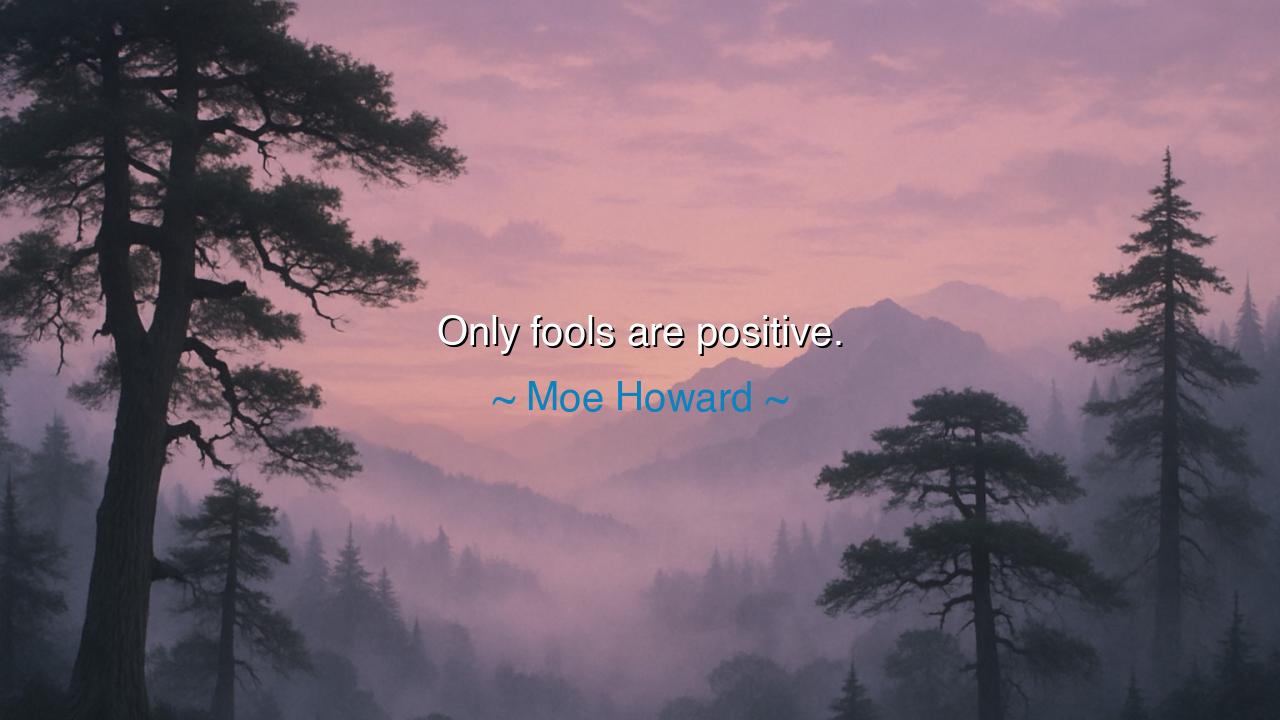
Only fools are positive.






Hear the sharp jest of Moe Howard, cloaked in humor but bearing the sting of truth: “Only fools are positive.” Though born from the world of comedy, these words echo with the wisdom of the ancients, for in them lies a warning about the dangers of arrogance and the blindness of certainty. To be utterly positive—unquestioning, unshaken, and without doubt—is not a sign of wisdom but of folly. For the wise know that life is uncertain, truth is layered, and even the strongest convictions must be tempered with humility.
The heart of this saying lies in its paradox. Positivity, when understood as optimism and hope, is noble and life-giving. But Moe Howard twists the word toward another meaning: absolute certainty, the refusal to question, the belief that one’s vision of reality is final and unchangeable. It is this kind of positivity that he calls foolish, for the fool claims to know all, while the wise admit the limits of their knowledge. In this jest, he reminds us that doubt, humility, and openness are the true companions of wisdom.
The ancients taught this with solemnity. Socrates, called the wisest of men, declared that he knew nothing. He refused to be positive in matters beyond human grasp, for he understood that certainty breeds pride, and pride blinds the soul. In contrast, the Sophists and demagogues of Athens spoke with bold positivity, certain of their doctrines, loud in their proclamations. Yet their certainty crumbled in the face of truth, while Socrates’ humble doubt became immortal wisdom. Thus, Howard’s jest carries the same lesson: beware of those who are always certain.
History too reveals this folly. Consider the story of the Titanic. The builders and sailors were positive that the great ship was unsinkable. With this certainty, they ignored warnings, dismissed caution, and failed to prepare lifeboats enough for all. Their positivity was their downfall, and the ocean claimed its toll. Here, arrogance disguised as certainty destroyed lives. It was not the iceberg alone, but the blindness of human pride, that sealed their fate.
Yet, let us not mistake Howard’s words as a rejection of hope. He does not mock the light of optimism, but the blindness of certainty. True positivity, the kind that uplifts and endures, does not come from denying uncertainty, but from walking within it with courage. The fool declares, “I cannot fail!” The wise say, “I may fail, yet I will still try.” The fool claims to know the future. The wise admit the unknown, but carry hope into it.
The lesson for us is clear: embrace uncertainty as a teacher. Do not be so positive in your opinions that you cannot listen, so certain in your path that you cannot turn, so sure of yourself that you cannot grow. Wisdom lives in humility, and strength is found in acknowledging weakness. To be cautious, to be questioning, to remain teachable—these are not signs of weakness, but of depth and greatness.
Practical steps flow from this teaching. When you feel utterly certain, pause and ask: What if I am wrong? What might I not yet see? In conversation, listen as much as you speak, and honor the perspective of others. When making decisions, prepare for more than one outcome, for life is a river that twists beyond foresight. And cultivate humility, remembering always that to admit uncertainty is not shameful—it is the mark of the truly wise.
So remember Moe Howard’s jest: “Only fools are positive.” Laugh at it, yes, but also take it to heart. For in a world filled with loud voices declaring absolute certainty, wisdom whispers: Be humble. Be open. Be ready to learn. Those who walk with humility will stumble less, while those who march in blind certainty may fall with great ruin. Choose the path of the questioning spirit, and you will find not folly, but truth.






HVHuy Van
This quote makes me reflect on humor and truth in Moe Howard’s words. Is calling positive people fools meant as satire, or is it a serious critique of optimism? I’m curious about the psychological effects of labeling positivity as foolish, and whether it encourages people to temper optimism with awareness, skepticism, or strategic thinking while still maintaining hope and motivation.
HMHa My
Reading this makes me question whether extreme negativity and extreme positivity are two sides of the same coin. Could Howard be emphasizing the importance of balance and critical realism? I’d like to discuss how people can cultivate a positive mindset without ignoring risks, challenges, or necessary caution, and how this balance impacts resilience and decision-making.
TTAn Nguyen Thi thuy
I find this quote thought-provoking because it challenges conventional wisdom. Are positive people sometimes underestimated or misunderstood as naive? How do we distinguish between constructive positivity that motivates and blind positivity that misleads? I’m curious about examples in leadership, business, or personal life where overly positive thinking caused mistakes versus where it led to success.
TNTam Nguyen
This statement raises questions about the boundaries of positivity. Is there a point where being positive becomes detrimental, such as when it masks problems or delays action? I’d like to explore whether Moe Howard’s comment is a humorous exaggeration or a cautionary observation about the limits of optimism in complex or challenging situations.
NVNguyen Vuong
Reading this, I feel skeptical but intrigued. Could labeling positivity as foolishness be more about caution against overconfidence or unrealistic expectations? I’m curious about the historical or cultural context behind this perspective. Does embracing positivity require wisdom and discernment, or can unexamined positivity truly be considered naive or foolish?